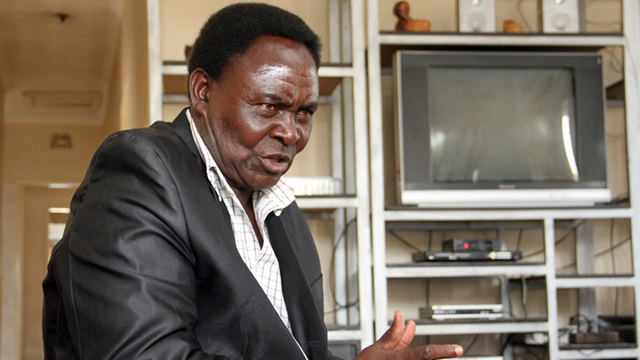By Prince Mushawevato
Multi talented and veteran arts practitioner Aaron Chiundura Moyo wants to terminate all of his publishing contracts, The Sunday Mail Society can reveal.

This development will see the author reclaim rights to all of his published works, some of which are over four decades old. At least six publishing companies will be affected by the move. Chiundura Moyo is arguably one of the best Shona novelists in Zimbabwe.
He has worked with a number of the once revered local publishing companies, among them Mambo Press, Longman Zimbabwe, Zimbabwe Publishing House (ZPH), Priority Projects, Mercury Press, Book Love, Books for Africa and the now defunct London Lion Press.
However, last week he took a swipe at the publishers, labelling them “a technophobic lot”. The celebrated novelist, scriptwriter, producer, playwright and actor believes writers are losing potential revenue due to publishers’ lethargy in embracing new technologies.
He boasts of more than 15 published novels but it is rare to come across his work on official market platforms. Some of his famous productions include “Uchandifungawo” (1975), “Ziva Kwawakabva” (1976), , “Wakandicheka Nerakagomara” (1982), “Chenga Ose” (1982), “Kuridza Ngoma Nedemo” (1983), “Matekenyapfungwa” (1984), “Wandibaya Panyama Nhete” (1986), “Ndabvazera” (1992), “Chemera Mudundundu” (2002), “Pane Nyaya” (2004), “The Other Side of The River” (2012) and “Kereke Inofa” (2012).
The author said what pains him most is that the bulk of his books have been used for years in schools as set books yet that has not translated to direct financial benefit for him. He remains the same old struggling Chiundura Moyo.
Investigations by this publication have shown that most schools are now in the business of printing and selling pirated copies of set books to their students. Proceeds from the illegal activities are registered in the respective academic institutions’ accounting books. The bane of literature piracy!
The firebrand arts practitioner said efforts to engage the publishers over the years have been futile.
“I’m disappointed with these publishing houses. Through lawyers and Government I want to terminate all contracts I have with publishing companies. I need to own the rights to all of my work so that I market it properly,” fumed Chiundura Moyo.
“The publishers are failing to find best ways to embrace technology and they keep hoping we will revert to old systems, which is not going to happen. They are not marketing our work on new media platforms (social media) like Twitter, Facebook, Instagram and WhatsApp even at bookshops.”
This somewhat helps one understand why Chiundura Moyo is on record declaring that he has never celebrated in life, not even kneel down to pray to God or ancestors. With decades of work experience and having produced literature pieces that not only thrill but sharpen readers’ brains, he still has nothing to show for it.
The “Ziva Kwawakabva” writer figures that publishers are now out of their depth.
“I understand the predicament that piracy has created for them but they are not doing much if anything at all to market our work. They have had the rights for decades but that has not helped. The problem is they remained static when the market required them to evolve.
“I’m currently working on private productions and using available online media platforms for marketing and its working. Why can’t they do the same? The work that I have published in the past should be enough to sustain me up to the day I drop dead but I still need to work harder than before,” bemoaned Chiundura Moyo.
Conversely, the publishing companies reckon they are doing the best to keep the literature industry afloat. They counter argue that they have embraced contemporary technological initiatives.
“ . . . this move, where our customers can now buy books online in cyberspace is one of the measures we have put in place to provide our clients with convenience. Now they can buy any book across our entire catalogue and pay online in the comfort of their homes,” said a top official from one of the publishing companies after launching a virtual shop.
But Chiundura Moyo still has no kind words. He said it is not only his relationship with publishers that has turned sour but that his colleagues share similar sentiments.
“They are letting me down. I have not stopped producing work but they are no longer publishing or marketing it. I did a revised version of ‘Ndabvazera’ with ZPH and they are yet to distribute it years after I submitted. I have also done ‘Chinaku Chinobva Muzevezeve’ and it is also yet to go into circulation. You cannot find our books in bookshops,” he said.
A remark from a literature school teacher at one of the country’s oldest mission schools paints a gloomy picture for the publishing industry.
“Initially we encouraged the kids to purchase their own set books but we ended up having challenges. They would complain that the books are not in stock hence we decided to improvise (photocopying at a cost) for them so that we don’t disrupt lessons. We have been doing so for years now,” said the school official who spoke anonymously.
Chiundura Moyo says it is his wish that Government addresses the piracy issue through stiff laws especially in schools. The revered author was born in 1950. He was inspired by the success of the likes of the Safirio Madzikatire and Bishop Patrick Chakaipa, Giles Kuimba, Webster Shamu and George Shaya.
He is the brains behind Zimbabwe’s first ever soap opera, Studio 263. Television programmes that have also made his name include the currently showing “Pedyo Kure”, “Ziva Kwawakabva”, “Chihwerure”, “Madhunamutuna”, “Zviri Mudendere”, “Zevezeve”, “Chioko Muhomwe”, “Tiriparwendo” and “Masimba”. Sunday Mail.






